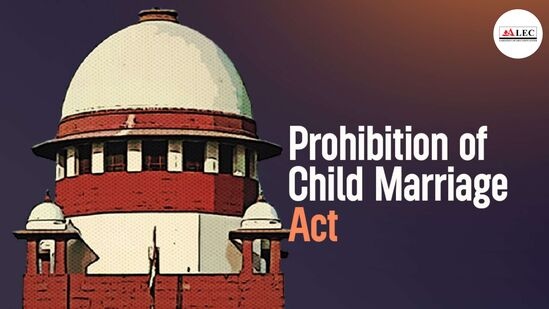Supreme Court's Decision on Child Marriage: Key Takeaways
On October 18, 2024, the Supreme Court of India made an important ruling regarding child marriage, choosing not to extend the Prohibition of Child Marriage Act (PCMA) to include all religions. This decision came after the Union government requested clarification that the PCMA should take precedence over personal laws governing marriage.
What is the Prohibition of Child Marriage Act,2006?
- The PCMA was enacted 18 years ago to fight the ongoing issue of child marriage in India. Despite its implementation, child marriages still occur at alarming rates, raising concerns among activists and citizens. The law aims to protect minors from being forced into marriage before they reach adulthood, safeguarding their rights and futures. It replaced the Child Marriage Restraint Act of 1929.
Highlights of the Supreme Court Ruling
The Supreme Court judgment came on a PIL by the Society for Enlightenment and Voluntary Action urging steps to check child marriages. The court recognized the complexities that arise from personal laws—rules based on religious beliefs—and how they interact with the PCMA.
The Union government, represented by Additional Solicitor General Aishwarya Bhati, asked the court to rule that the PCMA should override personal laws. However, the Supreme Court declined this request, noting that the government did not provide sufficient details about conflicting opinions from different High Courts.
The Need for Legislative Action
The Supreme Court pointed out that there is a pending bill in Parliament, introduced in December 2021, which seeks to clarify that the PCMA should have precedence over personal laws. However, this bill has not yet been considered. The court emphasized that legislative action is crucial to provide clarity and strengthen protections against child marriage.
Meanwhile, the court laid out specific guidelines to enhance measures aimed at preventing child marriages. One key issue raised was child betrothals, which the PCMA does not explicitly address. The court stated that these arrangements can violate a child’s rights and take away their ability to make choices about their future.
Addressing Child Betrothals
The court suggested that Parliament should consider making child betrothals illegal. This could help prevent individuals from circumventing the penalties associated with the PCMA by arranging marriages through betrothal instead.
A Collaborative Approach
While recognizing the importance of legal measures, the Supreme Court stressed the need for a collaborative approach to combat child marriage. It praised advocate Mugdha from the NGO Society for Enlightenment and Voluntary Action for highlighting gaps in the implementation of the PCMA.
The court argued that a comprehensive strategy is essential. Instead of relying solely on punitive measures, there should be efforts to educate communities and support vulnerable children.
Looking Ahead
The Supreme Court's decision reflects a nuanced understanding of child marriage and personal laws in India. While it did not mandate a universal ban across all faiths, the ruling underscores the urgent need for legislative reforms to better protect children.
As this issue continues to evolve, a multi-faceted approach will be vital. Cooperation among the government, civil society, and communities will be key to creating an environment where children can thrive without the threat of forced marriages.
In summary, while the Supreme Court’s ruling may not extend the child marriage ban to all religions at this time, it highlights the importance of addressing this critical issue through legislative action and community involvement. Protecting children's rights remains a pressing concern that requires ongoing attention and collective effort.
You can also read the latest judgement by visiting [Latest Judgment].
For more information, visit [ALEC Enquiry].

